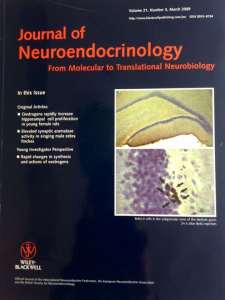 Liisa Galea has been studying how gonadal hormones affect the hippocampus since 1991.
Liisa Galea has been studying how gonadal hormones affect the hippocampus since 1991.
Her lab has outlined the first examples of hormonal regulation of neurogenesis in the adult hippocampus. Estradiol is related to cell proliferation levels in wild female meadow voles (Galea & McEwen, 1999) and both increases (4h) and suppresses, via adrenal steroids, cell proliferation (48h) (Ormerod, Galea, 2001; Omerod et al., 2003). ERα and β agonists upregulate cell proliferation (Mazzucco et al., 2006) and estradiol upregulates cell survival during a discrete period of the cell maturation cycle in male meadow voles (Ormerod et al., 2004).
Further, there is a sex difference in gonadal hormone regulation of adult hippocampal neurogenesis as androgens, but not estrogens, upregulate neurogenesis in the adult male (Spritzer & Galea, 2007; Hamson et al., 2013). Dwayne Hamson and I found that the ability of androgens to upregulate neurogenesis was dependent on the androgen receptor (AR) (Hamson et al., 2013). Dwayne Hampson showed, using both a pharmacological and genetic approach, that the AR was directly involved in promoting neurogenesis in the hippocampus (Hamson et al., 2013). We found that using testicular feminization mutation (TfM) rats (that have a non-functional AR) and flutamide, an AR antagonist, in wildtype rats, that DHT or Testosterone was unable to upregulate neurogenesis. Furthermore, we showed that there was no AR in the dentate gyrus which leads us to speculate that it is the AR in the CA3 region (the target region of these granule neurons) that promotes the survival of new neurons. Pilot work indicates that androgens increase neurogenesis in aged females but not young adult females. We work with Dr. Ashley Monks (University of Toronto) in both wild-type mice and mice that overexpress AR to explore how androgens upregulate survival of new neurons in the dentate gyrus (Ashlyn Swift-Gallant and Dwayne Hamson are working on this project).
We have also seen in the past that cell proliferation levels change across the breeding season in male meadow voles (Galea & McEwen, 1999; Ormerod & Galea, 2003) which is related to androgen levels. Females, but not males, show reduced neurogenesis in the hippocampus after repeated estradiol (Barker & Galea, 2008) and estrogens rapidly upregulate cell proliferation in young adult females (Barha et al., 2009). If the new neurons are born after exposure to estrogens, estrone decreases, but estradiol increases, neurogenesis (McClure et al., 2013). Premarin increases neurogenesis (Barha & Galea, 2013) and recent work suggests the GPER30 agonist decreases cell proliferation (Duarte-Guterman et al., 2015). Translational work, with Dr. Sherri Hayden, examined the effects parity on MMSE in women with dementia, MCI and no cognitive impairment (Galea & Hayden, in prep).